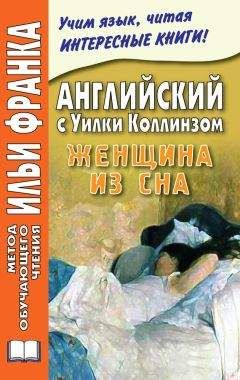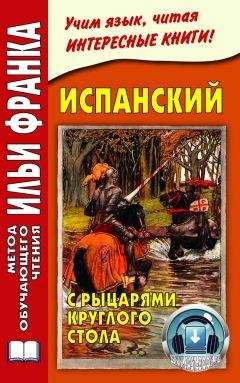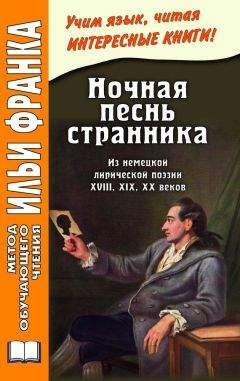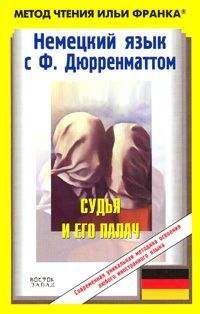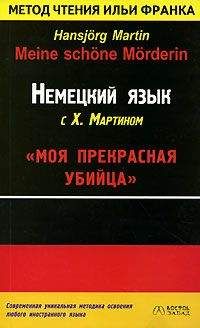“Good morning, sir,” says the rosy old man. “I’m a little hard of hearing. Was it you that was a-calling just now in the yard?”
Before I can answer, my wife interposes. She insists (in a shrill voice, adapted to our host’s hardness of hearing) on knowing who that unfortunate person is sleeping on the straw. “Where does he come from? Why does he say such dreadful things in his sleep? Is he married or single? Did he ever fall in love with a murderess? What sort of a looking woman was she? Did she really stab him or not? In short, dear Mr. Landlord, tell us the whole story!”
Dear Mr. Landlord waits drowsily until Mrs. Fairbank has quite done (дорогой мистер Хозяин сонно ждет, пока миссис Фэрбанк не закончит; drowsily – сонно; вяло; drowse – сонливость, дремота; quite – вполне, совершенно; совсем; to do – делать; заканчивать, кончать) – then delivers himself of his reply as follows (затем произносит следующий ответ: «ответ как следует /ниже/»; to deliver – доставлять; произносить, читать /лекцию, речь/; высказаться):
“His name’s Francis Raven (его имя/его зовут Фрэнсис Рейвен). He’s an Independent Methodist (он независимый методист; to depend – зависеть). He was forty-five year old last birthday (ему исполнилось сорок пять лет в прошлый день рождения; year /разг./ = years; birth – рождение). And he’s my hostler (он мой конюх). That’s his story (такова его история).”
My wife’s hot southern temper finds its way to her foot (горячая южная кровь моей жены устремляется: «находит свой путь» в ее ногу), and expresses itself by a stamp on the stable yard (и выражает себя = выражается в топанье об конюшенный двор; stamp – штамп, печать; топанье /ногами/; to stamp – штамповать, ставить печать; топать /ногами/).
The landlord turns himself sleepily round, and looks at the horses (хозяин сонно оборачивается: «поворачивает себя вокруг» и смотрит на лошадей). “A fine pair of horses, them two in the yard (прекрасная пара лошадей, эти две во дворе). Do you want to put ’em in my stables (вы хотите поставить их в мою конюшню; ’em = them)?” I reply in the affirmative by a nod (я отвечаю утвердительно кивком; affirmative – утверждение, заявление; утвердительный; to affirm – подтверждать; утверждать).
Dear Mr. Landlord waits drowsily until Mrs. Fairbank has quite done – then delivers himself of his reply as follows:
“His name’s Francis Raven. He’s an Independent Methodist. He was forty-five year old last birthday. And he’s my hostler. That’s his story.”
My wife’s hot southern temper finds its way to her foot, and expresses itself by a stamp on the stable yard.
The landlord turns himself sleepily round, and looks at the horses. “A fine pair of horses, them two in the yard. Do you want to put ’em in my stables?” I reply in the affirmative by a nod.
The landlord, bent on making himself agreeable to my wife (хозяин гостиницы, твердо решив угодить моей жене: «сделать себя приятным»; to bend – гнуть/ся/, сгибать/ся/; to be bent on /making/ smth. – твердо решиться на что-л., твердо решить сделать что-л.: «быть склонным сделать что-л.»; agreeable – приятный, милый; /разг./ выражающий согласие /сделать что-л./; to agree – соглашаться; /разг./ быть полезным, подходящим), addresses her once more (обращается к ней еще раз). “I’m a-going to wake Francis Raven (я собираюсь разбудить Фрэнсиса Рейвена; to be going to do smth. – собираться сделать что-л.). He’s an Independent Methodist. He was forty-five year old last birthday. And he’s my hostler. That’s his story.”
Having issued this second edition of his interesting narrative, the landlord enters the stable (выдав это второе издание своего интересного рассказа, хозяин входит в конюшню; to issue – выпускать, издавать). We follow him to see how he will wake Francis Raven (мы следуем за ним, чтобы посмотреть, как он разбудит Фрэнсиса Рейвена), and what will happen upon that (и что при этом произойдет). The stable broom stands in a corner (конюшенная метла стоит в углу); the landlord takes it – advances toward the sleeping hostler (хозяин берет ее, приближается к спящему конюху) – and coolly stirs the man up with a broom (и спокойно тычет в него метлой; cool – прохладный; спокойный, невозмутимый; to stir up – приводить в движение, побуждать; расшевелить, разбудить) as if he was a wild beast in a cage (словно тот был дикий зверь в клетке).
The landlord, bent on making himself agreeable to my wife, addresses her once more. “I’m a-going to wake Francis Raven. He’s an Independent Methodist. He was forty-five year old last birthday. And he’s my hostler. That’s his story.”
Having issued this second edition of his interesting narrative, the landlord enters the stable. We follow him to see how he will wake Francis Raven, and what will happen upon that. The stable broom stands in a corner; the landlord takes it – advances toward the sleeping hostler – and coolly stirs the man up with a broom as if he was a wild beast in a cage.
Francis Raven starts to his feet with a cry of terror (Фрэнсис Рейвен вскакивает на ноги с криком ужаса) – looks at us wildly, with a horrid glare of suspicion in his eyes (смотрит на нас дико, со страшным огнем подозрения в глазах = опасливо сверкая глазами; wild – дикий; бурный, безудержный; исступленный; horrid – страшный, ужасный; отвратительный; glare – яркий, ослепительный свет; взгляд /особ. пристальный, проницательный, свирепый/; огонь во взгляде) – recovers himself the next moment (приходит в себя в следующий миг; to recover – вновь обретать; приходить в себя, оправляться /от болезни, удивления, испуга и т. д./) – and suddenly changes into a decent, quiet, respectable serving-man (и неожиданно превращается в скромного, тихого, приличного слугу: «служащего человека»; to change – /из/менять/ся/; превращать/ся/; decent – приличный, порядочный; скромный, пристойный; quiet – тихий; спокойный; respect – уважение; почтение; to serve – служить, быть слугой).
“I beg your pardon, ma’am (прошу прощения, мэм; ma’am = madam – мэм, мадам; мэм /обращение прислуги к хозяйке/). I beg your pardon, sir (прошу прощения, сэр).”
The tone and manner in which he makes his apologies (тон и манера, в которой он приносит извинения) are both above his apparent station in life (/оба/ находятся выше его очевидного положения в жизни; apparent – видимый; очевидный, явный; station – место; станция; общественное положение). I begin to catch the infection of Mrs. Fairbank’s interest in this man (я начинаю заражаться: «подхватывать заражение» интересом миссис Фэрбанк к этому человеку; to catch – поймать, схватить; заразиться, подхватить /болезнь/; infection – инфекция, заражение; заразительность /примера/). We both follow him out into the yard to see (мы оба следуем за ним во двор, чтобы посмотреть) what he will do with the horses (что он будет делать с лошадьми).
Francis Raven starts to his feet with a cry of terror – looks at us wildly, with a horrid glare of suspicion in his eyes – recovers himself the next moment – and suddenly changes into a decent, quiet, respectable serving-man.
“I beg your pardon, ma’am. I beg your pardon, sir.”
The tone and manner in which he makes his apologies are both above his apparent station in life. I begin to catch the infection of Mrs. Fairbank’s interest in this man. We both follow him out into the yard to see what he will do with the horses.
The manner in which he lifts the injured leg of the lame horse (манера, в которой = то, как он поднимает поврежденную ногу хромого коня; to injure – ушибить, повредить, ранить) tells me at once that he understands his business (сразу же говорит мне, что он смыслит в своем деле; to understand – понимать; смыслить, быть сведущим /в чем-л./). Quickly and quietly, he leads the animal into an empty stable (быстро и спокойно он заводит животное в пустое стойло); quickly and quietly, he gets a bucket of hot water (быстро и спокойно берет ведро горячей воды; to get – доставать и приносить), and puts the lame horse’s leg into it (и ставит в него ногу хромого коня). “The warm water will reduce the swelling, sir (теплая вода уменьшит опухоль, сэр; to reduce – снижать, ослаблять, уменьшать; to swell – надувать/ся/, раздувать/ся/; опухать). I will bandage the leg afterwards (потом я перевяжу ногу; to bandage – бинтовать, перевязывать; bandage – бинт; перевязка; afterwards – впоследствии, позже).” All that he does is done intelligently (все, что он делает, делается с толком; intelligently – умно, разумно, с пониманием /дела/); all that he says, he says to the purpose (все, что он говорит, он говорит по делу; to the purpose – к делу, кстати; purpose – намерение, цель; замысел).
Nothing wild, nothing strange about him now (ничего дикого, ничего странного в нем теперь нет). Is this the same man whom we heard talking in his sleep (неужели это тот же самый человек, который, как мы слышали, говорил во сне)? – the same man who woke with that cry of terror (тот же самый человек, который проснулся с тем криком ужаса) and that horrid suspicion in his eyes (и тем страшным подозрением в глазах)? I determine to try him with one or two questions (я решаю задать ему один или два = пару вопросов; to determine – определять; решать/ся/, принимать решение /сделать что-л./; to try – пытаться, пробовать; испытывать; расследовать /дело, случай/).
The manner in which he lifts the injured leg of the lame horse tells me at once that he understands his business. Quickly and quietly, he leads the animal into an empty stable; quickly and quietly, he gets a bucket of hot water, and puts the lame horse’s leg into it. “The warm water will reduce the swelling, sir. I will bandage the leg afterwards.” All that he does is done intelligently; all that he says, he says to the purpose.
Nothing wild, nothing strange about him now. Is this the same man whom we heard talking in his sleep? – the same man who woke with that cry of terror and that horrid suspicion in his eyes? I determine to try him with one or two questions.
“Not much to do here,” I say to the hostler (не много здесь работы: «не много делать здесь», – говорю я конюху).
“Very little to do, sir,” the hostler replies (очень мало, сэр, – отвечает конюх).
“Anybody staying in the house (кто-нибудь живет в гостинице; to stay – оставаться; останавливаться, гостить)?”
